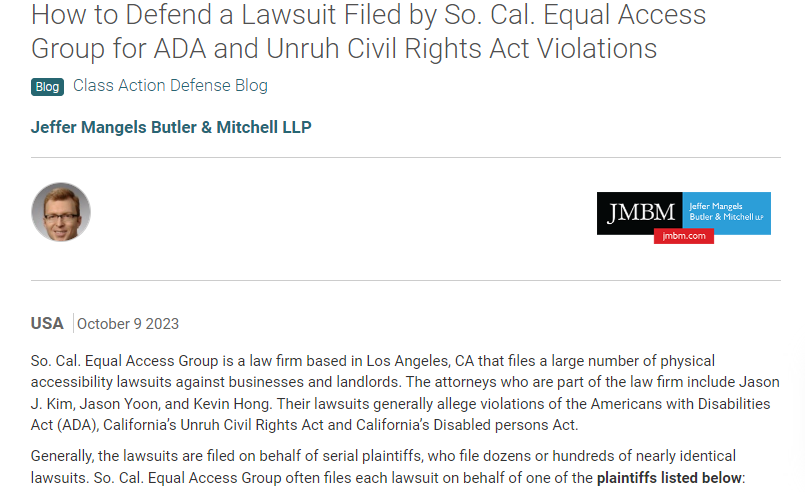A LA-based law firm, comprising Korean American attorneys, is allegedly engaged in filing a series of lawsuits accusing companies of violating the Americans with Disabilities Act (ADA).
The lawyer who wrote about the firm even listed the names of the plaintiffs, who frequently file disability public interest lawsuits, urging business owners to exercise caution.

“So. Cal. Equal Access Group is a law firm based in Los Angeles, CA, that files a significant number of physical accessibility lawsuits against businesses and landlords,” said Stuart K. Tubis, an attorney at Jeffer Mangels Butler & Mitchell LLP specializing in the defense against ADA and Unruh Civil Rights Act violations lawsuits. “The lawyers at the firm are named Kim, Yoon, Hong, and others, and they primarily allege ADA violations.” This article was published on September 9 on Lexology, a platform providing legal news and more.
Tubis also elaborated on the Equal Access Group’s litigation patterns and the typical plaintiffs they represent.
He stated, “Generally, the lawsuits are filed on behalf of serial plaintiffs, who lodge dozens or hundreds of nearly identical lawsuits. Each suit generally alleges that a plaintiff is physically disabled, visited the property on a specific date (often several months prior to filing the lawsuit), and encountered accessibility barriers that inhibited full and equal access to the property.”
Twenty-four plaintiffs were identified in the lawsuit, including “Yeong Lee,” believed to be Korean American.
The primary allegations involve violations related to handicapped parking space regulations, issues with parking spaces reserved for handicapped vans, and a deficiency of international symbols for handicapped parking spaces.
Specifically, the lawsuits are being filed in the United States District Court, Central District of California.
“A defendant has 30 days from the date of service (i.e., receiving the complaint) to respond to the complaint. In federal court, the response must be filed within 21 days of service. Generally, responding involves either admitting or denying the various allegations and asserting various affirmative defenses,” Tubis explained. “However, it might be more prudent to file a motion to dismiss if strong defenses are present.”
Tubis further discussed the steps that business owners and landlords could undertake if an ADA lawsuit is filed against them, suggesting hiring expert attorneys and certified accessibility inspectors (CASp), considering settlement options, and requesting dismissal if no issues are present.
Several other law firms have also addressed the issue of disability public interest litigation against “equal access” groups. Firms like Karlin, Tumer & Sharif, and Sahelian provide information on their websites about such groups and list plaintiffs’ names.
For instance, in Karlin’s case, the list of plaintiffs includes several Korean American names such as Hee Soon Park, Kee Sook Ahn, and In Sun Kil.
The ongoing controversy surrounding ADA lawsuits relates to legal concepts of public interest versus abuse, which continues to fuel criticism of ADA lawsuits.
The U.S. Chamber of Commerce Institute for Legal Reform has labeled ADA lawsuits as a “gold rush,” citing the propensity to file suits in state and local courts where litigation costs are likely to surpass any potential settlement.
ADA lawsuits are evolving. “In recent years, the focus of ADA lawsuits has shifted towards web and mobile app accessibility,” noted Jinni Kang (LA), pointing out that 37% of federal cases last year pertained to web accessibility under the ADA.
Meanwhile, California saw a total of 2,519 ADA violation lawsuits filed last year, ranking second in the nation after New York with 3,173 cases.
BY YEOL JANG, JUNHAN PARK [jang.yeol@koreadaily.com]




